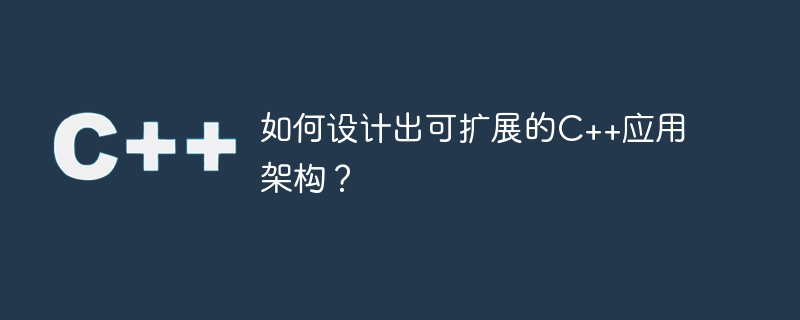

How to design a scalable C application architecture?
1. Introduction
In the software development process, it is very important to design a scalable application architecture. Scalability refers to enabling the system to adapt to future changes in requirements by adding new functions or changing existing functions without the need for large-scale refactoring. In C language, through reasonable design and good programming practices, we can achieve a scalable application architecture.
2. Design principles
3. Sample code
The following is a simple sample code that shows how to implement a scalable C application architecture through design patterns and the above design principles:
// 接口定义
class ILogger {
public:
virtual void log(const std::string& message) = 0;
};
// 具体实现
class ConsoleLogger : public ILogger {
public:
void log(const std::string& message) override {
std::cout << "ConsoleLogger: " << message << std::endl;
}
};
class FileLogger : public ILogger {
public:
void log(const std::string& message) override {
// 写入日志到文件
}
};
// 使用依赖注入
class MyApp {
private:
ILogger* logger;
public:
MyApp(ILogger* logger) : logger(logger) {}
void run() {
// 应用程序逻辑
logger->log("App is running...");
}
};
int main() {
ILogger* logger = new FileLogger(); // 根据需要可以替换为其他类型的日志记录器
MyApp app(logger);
app.run();
delete logger;
return 0;
}In the above example code, we define an ILogger interface for logging, and then implement two specific loggers ConsoleLogger and FileLogger. In the MyApp class, we use dependency injection to inject the logger so that the implementation of the logger can be easily replaced as needed. This is consistent with the dependency inversion principle and the open-closed principle.
By following the above design principles and good programming practices, we can design a more flexible and scalable C application architecture. When requirements change, we only need to focus on the code for new and modified functions without the need to refactor the entire system on a large scale. This will greatly improve our development efficiency and system stability.
The above is the detailed content of How to design a scalable C++ application architecture?. For more information, please follow other related articles on the PHP Chinese website!




